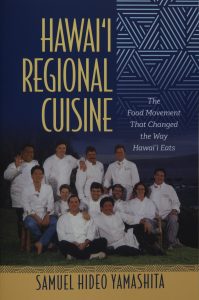Bibliography
Books
Hawai’i Regional Cuisine: The Food Movement That Changed the Way Hawai’i Eats (University of Hawai’i Press, 2019)
Daily Life in Wartime Japan, 1940-1945 (University Press of Kansas, 2015)
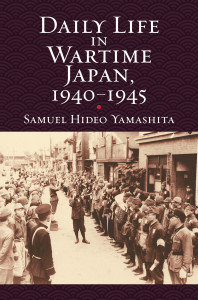
Leaves from an Autumn of Emergencies: Selections from the Wartime Diaries of Ordinary Japanese (University of Hawai’i Press, 2005)
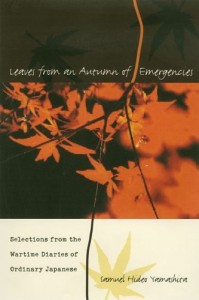
Master Sorai’s Responsals: An Annotated Translation of Sorai Sensei Tōmonsho (University of Hawai’i Press, 1995)
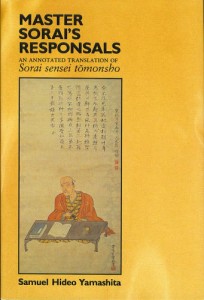
Co-translator, The Four-seven Debate: An Annotated Translation of the Most Famous Controversy in Korean Thought (State University of New York Press, 1993)
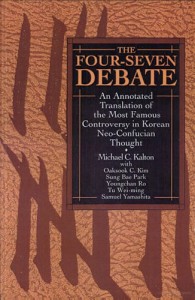
Selected Scholarly Articles & Other Writings
“The ‘Japanese Turn’ in Fine Dining in the United States, 1980-2020,” Gastronomica 20 (summer): 45-54.
“Popular Japanese Responses to the Pearl Harbor Attack, December 7, 1941 – January 8, 1942,” in Beth Bailey and David Farber, eds., Beyond Pearl Harbor: A Pacific History (University Press of Kansas, 2019), 76-101.
“Introduction,” for updated second edition of Mikiso Hane, Peasants, Rebels, Women, Outcasts (Washington, D.C. : Rowman & Littefield, 2016), xix-xl.
“Pictures for our ‘Honorable American Friends’, ” Cross-Currents: East Asian History and Culture Review (spring 2013), 175-185.
“The Food Problem of Evacuated Children in Wartime Japan, 1942-1945” in Kataryzna Cwiertka, ed., Food in Zones of Conflict (Ashgate, 2013), 131-148.
“Foreward” to Curtis Tong, Child of War: A Memoir of World War II Internment in the Philippines (University of Hawai’i Press, 2010), ix-xii.
“Kamikaze: Religion in the Diaries of Imperial Japanese Army and Navy Special Attack Pilots,” in Madelon DeKeizer et al., eds., Religie: Godsdienst en geweld in de tweintigste eeuw (Zuthpen: Walburgpers 2006), 137-153.
“Foreward” to Frank Gibney and Beth Cary, Sensō: The Japanese Remember the Pacific War (M. E. Sharpe, 2006), vii-ix.
“Yamazaki Ansai and Confucian School Relations, 1650-1675,” Early Modern Japan: An Interdisciplinary Journal 9 (Fall 2001): 3-18.
“War and Ethnicity in the Study of Modern Japan,” in Japan in the World / The World in Japan (University of Michigan Press 2001), 181-195.
“The Aloha Team 1942-1943,” in Brian Niiya, ed., More Than a Game: Japanese Americans and Sports (Japanese American National Museum 2000), 162-173.
“Asian Studies at American Private Colleges, 1808-1990,” in Suzanne Barnett & Van Symons, eds., Asia in the Undergraduate Curriculum: A Case for Asian Studies in Liberal Arts Education (Sharpe, 2000), 23-51.
“Reading the New Tokugawa Intellectual Histories,” Journal of Japanese Studies 22 (Winter 1996): 1-48.
“Confucianism and the Modern Japanese State 1904-1945,” in Tu Wei-ming, ed., Confucian Traditions in East Asian Modernity: Moral Education and Economy and Culture in Japan and the Four Mini-Dragons (Harvard University Press 1996).
“School Relations in Ogyū Sorai’s Miscanthus Patch Academy,” Asian Cultural Studies, Bessatsu 3 (1992): 19-32.
“The Silent Revolution in Tokugawa Thought (in Japanese),” Kikan nihon shisōshi (Japanese Intellectual History Quarterly) 1988.
“Nature and Artifice in the Writings of Ogyū Sorai (1666-1728),” in Peter Nosco, ed., Confucianism and Tokugawa Culture, (Princeton University Press 1984), 138-165.
“The Early Life and Thought of Itō Jinsai,” “The Early Life and Thought of Itō Jinsai (1627-1705),” Harvard Journal of Asiatic Studies, 43 (1983): 453-480.
Selected Scholarly Presentations
“The ‘Japanese Turn’ in Fine Dining in the United States, 1980-2018,” University of Hawai’i-Manoa, April 2019.
“Hunger on the Japanese Home Front,” delivered as part of a panel on “What to Eat: Food and Feeding in Twentieth-Century Wartime Asia,” at the annual meeting of the Association for Asian Studies, Seattle, April 2016
“The Cost of Victory: The Hunger of Evacuated Children in Wartime Japan,” delivered as part of a panel on “Children in Wartime Asia, 1931-1945” at the annual meeting of the Association for Asian Studies, Toronto, Canada, April 2012
“Mobilizing the Homefront for War,” presented at a conference on “Origins of World War II in Asia,” University of Pittsburgh, October 2011
“The Hunger of Victory: Evacuated Children and Food in Wartime Japan,” presented at a conference on “Food in Zones of Conflict,” Leiden University, Netherlands, August 2011
“The Significance of Hawai’i Regional Cuisine in Postcolonial Hawai’i,” delivered as part of a panel entitled “”Food on the Move: Manipulations of Cuisines and Culinary Practices,” annual meeting of the Association for Asian American Studies, New Orleans, May 2011
“Coercion, Compliance and Resistance in Wartime Japan, 1942-1945” delivered at the University of Hawai’i-Manoa and the University of California-Santa Barbara, April 2010.
“The Wartime Food Situation in Urban and Rural Japan,” presented as part of a panel on “New Perspectives on Food in Wartime Japan,” annual meeting of the Association for Asian Studies, Philadelphia, March 2010.
“Reimagining the Intellectual Landscape of ‘Early Modern’ Japan,” presented at “The Early Modern in East Asia: The Challenge of Periodization,” USC-Huntington Early Modern Studies Institute, University of Southern California, February 2008.
“Learning to Die: the Training of Kamikaze Pilots,” delivered at the University of North Carolina-Chapel Hill, September 2007.
“Licking Salt for the Nation: Food and Diet in Wartime Japan 1937-1945,” delivered at the University of Southern CA, March 2007.
“Reflections on Reading Wartime Japanese Personal Narratives,” delivered at a “Workshop on Reading Personal Narratives of the Second World War in East Asia 1937-1945,” held at the Reischauer Institute of Japanese Studies, Harvard University, December 2006.
“Constructing the ‘Nation’ in the ‘Last Letters’ of Special Attack Pilots,” presented as part of a panel on “Self Discipline and Survival: Servicemen’s Diaries and Subjectivity in China and Japan 1937-1945,” annual meeting of the American Historical Association, Philadelphia, January 2006.
“The Wartime Experiences of Ordinary Japanese,” presented as part of a panel on “Reading the Wartime Diaries of Ordinary People in Europe and Asia 1937-1945, annual meeting of the American Historical Association, January 2003.
“Yamazaki Ansai and Confucian School Relations, 1650-1675,” presented as part of a panel on “Rethinking School Relations in Tokugawa Japan,” Association for Asian Studies, Chicago, March 2001.
“Reading the ‘Last Letters’ and Diaries of Kamikaze Pilots,” delivered at U.C.L.A., May 1999.
“Tokugawa zenki ni okeru jukyō gakuha: dōtoku mondai o megutte (Confucian School Relations in the Early Tokugawa Period: Ethical Issues),” presented (in Japanese) to the Social Science Research Group, Dōshisha University, Kyoto, Japan, April 1998.
“Confucian School Relations on Ethical Issues, 1650-1675,” presented at a conference on “Confucian Currents in Japan and East Asia, 17th to 19th Centuries,” National University of Singapore, December 1997.
“Reading Revenge in the Akō Rōnin Affair,” presented as part of a panel on “Exploring the Akō Incident Controversy” at the Association for Asian Studies, Chicago, March 1997.
“Chūshingura: The ‘Real Story’?,” presented at a Symposium in Honor of Leonard Pronko, Pomona College, April, 1996.
“Reading the New Tokugawa Intellectual Histories,” presented at the University of California- San Diego, La Jolla, CA, October 1995.
“Historical Memory, Discipline, and the ‘Last Letters’ of the Special Attack Force Pilots,” presented at a “Symposium on “Memory and Culture: Japan, the U.S. and Asia since Hiroshima,” University of Oregon, May 1995.
“Can the Enemy Speak?—Reading the ‘Last Letters’ of the Special Attack Force Pilots,” presented at West Coast meeting of the Association for Asian Studies, Claremont, October 1994.
“Reading, Contesting and Consuming Revenge: The Case of the “Righteous Warriors” of Akō,” presented at a conference on “Cultural Constructs, Social Representations in Japan,” U.C.L.A., May 1993.
“Warrior Vendettas in Eighteenth-century Japan,” presented to the Thursday Forum on Historical and Cultural Studies, Claremont Graduate School, April 1993.
“Fukō na shitei kankei-Dazai Shundai no Ogyū Sorai ate no rasuto retta” (Unhappy teacher-student Relations—Dazai Shundai’s Last Letter to Ogyū Sorai),” delivered (in Japanese) at International Christian University, Tokyo, spring 1991.
“The Taoist Turn in Ogyū Sorai’s Miscanthus Patch Academy,” presented as part of a panel on “Testing Limits: Inventing Traditions in Mid-Tokugawa Japan” at the annual meetng of the Association for Asian Studies, New Orleans, April 1991.
“Confucian Ethical Discourse in Japan,” presented to a workshop on Confucian Humanism, American Academy of Arts and Sciences, Cambridge, MA, May 1989.
“The Confucian Debate on the ‘Righteous Warriors of Akō’,” presented as part of a panel on “The Enduring Paradigm: The Confucian Bedrock in Japanese Thought” at the annual meeting of the Association for Asian Studies, Washington, D.C., March 1989.
“Hattori Nankaku’s Chinese Room,” presented at a symposium on “Concepts of the Chinese in 18th-century Japan,” Pomona College, Claremont, December 1988.
“The Impact of the Four-seven Debate on Seventeenth-century Japanese Confucianism,” presented to a workshop on Korean Neo-Confucianism, U.C.L.A., Los Angeles, February 1988.
“Self Cultivation in the Ancient Learning Movement,” presented at the annual meeting of the Association for Asian Studies, Boston, April 1987.
“The Silent Revolution in Tokugawa Thought,” presented to the University Seminar in Neo-Confucian Studies, Columbia University, New York, December 1985.
“Chinese Elements in the Ethical Discourse of the Ancient Learning School,” Western Conference of the Association for Asian Studies, Claremont, October 1985.
“An Undiscovered World in Tokugawa Confucianism,” Southern California Japan Seminar, U.C.L.A., Los Angeles, February 1985.
“The Silent Revolution in Tokugawa Thought,” New England Japan Seminar, Harvard University, Cambridge, MA, March 1983.
“Nature and Artifice in the Writings of Ogyū Sorai (1666-1728),” Workshop on Japanese Responses to Neo-Confucianism, St. John’s University, New York, April 1981.
“Using Compasses and Carpenter’s Squares: The Early Life and Thought of Itō Jinsai (1627-1705),” East Asian Studies Colloquium, Harvard University, Cambridge, MA, March 1980.
“Praxis and Personality in Tokugawa Confucianism: The Case of Itō Jinsai and Ogyū Sorai,” University of Chicago, Chicago, spring 1976.
“Itō Jinsai and Ogyū Sorai: The Birth of Tokugawa Naturalism,” Conference on “Practical Learning in the Ming and Early Tokugawa Periods,” East-West Center, University of Hawai’i-Manoa, Honolulu, June 1974.
Selected Public Lectures
“Japanese Cuisine in the Los Angeles Restaurant World,” presented as a part of “A Taste of Home: Dining Out in Japanese America,” Japanese American National Museum, Los Angeles, January 17, 2021.
“Hawai’i Regional Cuisine & the Evolution of Agriculture in Hawai’i,” keynote address, Hawai’i Agricultural Foundation, ‘ Alohilani Resort Waikiki Beach, July 18, 2019.
“Understanding Daily Life in Wartime Japan, 1940-1945,” 92nd Street YHMA, New York City, November 4, 2016.
“Did the War with Japan Have to End in the Way It Did?” presented at “Pomona in the City,” San Francisco, April 2016 and Dana Point, November 2015.
“Using Diaries and Letters to Reconstruct Homefront Life in Wartime Japan,” presented at the Summer 2012 Teacher Institute program “World War II: How It Transformed America, the Pacific and Asia,” sponsored by the Pacific Historical Parks, the Hawai’i Humanities Council, the University of Hawai’i Oral History Center, and the Grindstone Foundation, Honolulu, July 2012.
“Wartime Mobilization and its Discontents,” delivered as the annual Steine Jonasson Lecture, Linfield College, April 2012.
“The Beginnings of Japanese Food,” presented as the annual Japan Series Lecture, Lyon College, Arkansas, February, 2012.
“Was There Popular Resistance to the Wartime Japanese Government?” delivered in Claremont and Tokyo, 2010-2011.
“Coercion, Compliance and Resistance in Wartime Japan, 1942-1945,” delivered as the Grant Goodman Distinguished Lecture in Japanese Studies, University of Kansas, Lawrence, April 2009.
“Vendettas and the Tokugawa Order,” presented in conjunction with an exhibition on “Art of the Samurai” at the Bowers Museum, Santa Ana, CA, May 2008.
“While Joe DiMaggio Played Under Hawaiian Skies…,” Los Angeles & Claremont, 2008.
“The Challenge of Teaching ‘Asia’ in the Twenty-first Century,” keynote address delivered at “The Luce Fund for Asian Studies Capstone Conference,” Princeton, October 2007.
“Writing the History of Everyday Life in Wartime Asia,” keynote address delivered at a “Symposium on Asia and the Liberal Arts,” University of Puget Sound, Tacoma, April 2007.
“Reflections on Letters from Iwo Jima,” Mortarboard Last Lecture Series, Pomona College, Claremont, April 2007.
“Recovering the Voices of Ordinary Japanese in World War II,” presented as the keynote address at the “Symposium on Asia in the Curriculum,” UCLA, Los Angeles, October 2006.
“The Shape of the Future: Asian Studies in the Twenty-first Century,”delivered as the keynote address at a workshop on “Developing Asian Studies at Historically Black Colleges and Universities,” Spelman College, Atlanta, October 2006.
“Recovering the Voices of Ordinary Japanese in World War II,” presented as part of the “Authors on Asia” series, Pacific Asia Museum, Pasadena, August 2006 and the “Meet the Authors” series, Asia Society of New York, October 2005.
“Journey to Gandhara,” delivered as the keynote address at the opening Convocation, Pomona College, Claremont, September 2004.
“The Ex-sapper’s Wink: Reading Michael Ondaatje’s The English Patient,” delivered as the Distinguished Faculty Lecture, Pomona College, Claremont, August 1997.
“Be Sure to Drag Your Tail Through the Mud,” presented as the faculty address at Class Day, Pomona College, Claremont, May 1996.
“Remapping the Tropics of Rage,” Mortarboard Last Lecture Series, Pomona College, Claremont, April 1994.
